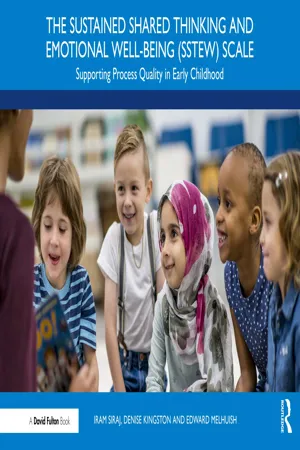
The Sustained Shared Thinking and Emotional Well-being (SSTEW) Scale
Supporting Process Quality Quality in Early Childhood
- 64 pages
- English
- ePUB (mobile friendly)
- Available on iOS & Android
The Sustained Shared Thinking and Emotional Well-being (SSTEW) Scale
Supporting Process Quality Quality in Early Childhood
About This Book
The SSTEW Scale helps all those working with children aged two to six to achieve their full potential and enjoy the benefits and pleasure of delivering high quality early education and care.
The Quality Rating Scale (QRS) is a tool to uplift process quality in Early Childhood Education and Care and it is known to be predictive of child development. Using it to support quality improvement in a setting or class will result in enhancing children's learning and development.
Designed to measure and promote practice that supports children and adults engaging in sustained shared thinking (SST) and emotional well-being (EW), it facilitates the development of strong relationships, effective communication, self-regulation and concept development. It looks at the quality of interactions that occur between the adults and the children and between the children themselves. It also considers the responsiveness of the adults to the children and how they intentionally support children's play, learning and development.
It can be used by practitioners at all levels, helping them to take a systematic approach to self-assessment so that they can build on what they do well and improve where they need to. It is also an essential resource for measurement by researchers and those engaged in auditing settings.
This new edition includes updated information about the evidence-base for SSTEW and children's development and learning as well as new examples of practice and supplementary information accompanying the indicators. In addition, there is a stronger focus on formative assessment and new additions to the assessment section.
Online or face to face training can be set up via the authors' dedicated website https://birthtosevenmatters.co.uk/
Frequently asked questions
Information
Table of contents
- Cover
- Endorsement page
- Half Title
- Title Page
- Copyright Page
- Table of Contents
- List of figures
- List of tables
- Foreword by Professor Kathy Sylva
- Acknowledgements
- About the authors
- Introduction to the Sustained Shared Thinking and Emotional Well-being (SSTEW) Scale
- Rationale for the development of the SSTEW Scale
- Rationale for the second edition of the SSTEW Scale
- The underlying principles of the SSTEW Scale
- Aspects of child development and accompanying theories, relevant to the SSTEW Scale
- The structure of the SSTEW Scale: principles and practice
- Content of the SSTEW Scale
- Preparing to use the SSTEW Scale
- Subscale 1: Building trust, confidence and self-regulation
- Subscale 2: Supporting and extending language and communication
- Subscale 3: Supporting learning and critical thinking
- Subscale 4: Planning and authentic assessment
- The SSTEW Scale score sheet
- Rough plan of indoor and outdoor areas being observed
- Score sheets
- The SSTEW Scale profile
- Joint observation/inter-rater reliability for the SSTEW Scale
- References